Independent filmmaker Dominic Sangma, making waves with his films on the national and international stage, opens up about his approach to the telling visual stories.
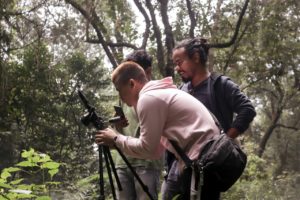
An old man, probably in his 90s, discovers a deep sense of longing as his son returns home, in the quest for meaning. This sets the events of the 2018 film, Ma.Ama.
The scene shifts and this time…
The night is full. Amid the sound of the forest, we hear the village elder singing a song about the myth of the Garos. Around him are young men and women. A little boy is a keen listener. Thus, begins a journey in the short film, Rongkuchak (2013).
Another transition, and…
A young man reluctantly explores the ‘unconventional’ in a rapidly changing world. This becomes the premise of his first short film, Karyukai Inc (2011).
These visuals capture the essence of Meghalaya-based independent filmmaker Dominic Sangma’s cinema. It’s been quite a journey from Nongthymmai Garo, a village in Meghalaya’s Ri-Bhoi district to Satyajit Ray Film and Television Institute (SRFTI) in Calcutta.
His films have received critical appreciation both nationally and internationally, having bagged awards in different film festivals.
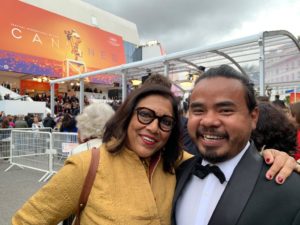
Journey of Imagination
Dominic credits the oral tradition of storytelling for shaping his interest in stories. Reminiscing about his childhood, he says: “I would always hang out with the old people who used to tell stories. These stories gave me company. My uncles and a few family members from my grandfather’s side are oral storytellers.”
His father, Philip Sangma, ran St Michael’s School, about 5 km from his village. The path was a steep hill. On his way home, he would imagine and tell stories to himself. It would make the climb less laborious as he would be transported to his rich inner world.
He discovered early on that he could protect himself from reality through his imagination.
That he loved telling stories was an important realisation. On the way to school, he would tell stories to his schoolmates. “I think these are some of the most important moments that somehow has made me who I am today,” he said, adding how he considers them to be the seed because filmmaking is an extension of his own life, not a hobby.
Cinema, for him, is about figuring out life and the chaos around him. “Life is a galaxy in itself. The galaxy is chaotic in nature and we try to make meaning out of it. After making a film, I want to know if it is relatable. Do the audience feel this sense of chaos and loneliness or am I the only one?”
As a filmmaker, he looks for this sense of connect with the audience.
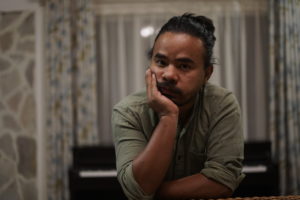
The Present is the Future
Kolkata was the first place he went out to study and he stayed there for a long time. The internet was still about to explode in a big way. There were internet cafes in the film institute. He sensed how social media and technology would take over our lives and wanted to express his own loneliness in a new space.
While making the film, he felt that technology would replace the ‘human touch’ sooner. People around him would say otherwise. This gut instinct led him to explore technology in the context of human relationships in his first short film, Karyukai Inc.
“Some of my friends told me that a Sci-Fi film should look futuristic with colour tones of silver and green but I wanted a warm look to depict the urgency of technology and also represent the human touch. At the same time, I wanted to capture the coexistence of a cold and lonely world,” he says.
To pause, observe and reflect became a ritual in the process of making this film. “People tell me how it’s their reality now,” he chuckles.
Karyukai Inc travelled to international film festivals in Munich, Kosovo and Russia in 2011, probably the first from Meghalaya.
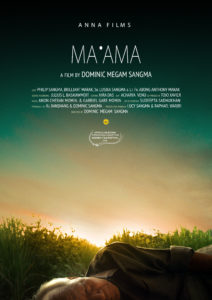
Echoes
In Garo, Rongkuchak means ‘echoes’; it was his final diploma film in SRFTI.
He was reading poems by the Palestinian poet, Mahmoud Darwish. Reading his poetry made him look at his own tribe. Since there is no written script, Roman alphabets are used. This uneasy co-existence between the oral tradition and the written word in a foreign language became a recurring motif.
“It’s a reason why our histories, myths and folktales could not survive because we don’t enjoy reading them. Garo, as a language, is so beautiful when they sing poetry,” he says.
In a way, this film is futuristic. Dominic said how Ianche Sangma (the protagonist in the film) fills him with hope – that one day, a poet like Ianche will write a very good poem in Garo which will be translated into English and earn critical praise; that the people will pause and reflect on their language.
Dominic spoke of his childhood memory of taking bath in the forest. He would shout and his voice would echo back. His father would tell him that it was the voice of his forefathers. Rongkuchak explores this idea and his identity as a tribe. We spoke of the opening and ending shots in the film and how it became important for Ianche to embrace his true self, as past and present became one in a dream-like blurry space.

Garo is personified as a woman who he calls “the angel of language”. With the dearth of storytellers in the present, Dominic wonders about the loss of the history of the community when an oral storyteller passes away.
Rongkuchak won the best film at National Student Film Award in 2014 and was selected in a few film festivals in Venice and Tunisia (2015) and China and India (2014). It was screened at the 2nd North Eastern Film Festival (2015) and Brahmaputra Valley Film Festival and the 1st Tura Film Festival (2014). It was the official selection at the 46th International Film Festival of India, Goa.
Memory and Longing
“Imagine a man who couldn’t be with his first wife completely and he had this sense of longing. At the same time, he tries to be with his second wife.”
Through Ma.Ama, Dominic explores his own memory of his late mother. His first feature film is about his ageing father who constantly navigates between the past and the present. He lost his mother at a very early age.
In the process, the journey became a cathartic experience. Cinema became a medium for his family to come together and embrace their experiences.
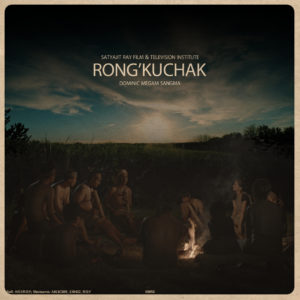
On capturing the frailty of time, the filmmaker says: “My father mixed up a lot of things, cocooned in his own skin because he can’t hear and see properly. His memories, too, have become blurry and he sees manifestations of his past in the present. To tap into your memory is like jumping into the water.”
On the haunting opening dream sequence in the film, Dominic said a dream can be powerful and move things, adding how it can influence life and life can influence cinema.
His father acted in this film and gave life to the character with quiet dignity. The other cast members had no prior experience in front of the camera.
Ma.Ama is a deeply personal story about embracing life and came as a result of his conversations with his father, who was the first person to watch the film. “After the end of the film, he told me that he was looking at the mirror of his own life. Things that I could not do in life, I did in this film. It’s such a beautiful thing to say,” he says.
It became the first Garo film to win the National Award, made in collaboration with Chinese producer, Xu Jianshang. His cinematographer, Acharya Venu became the first Indian to win for cinematography in the 22nd Shanghai Film Festival (2019).
The film won awards at international film festivals in Kazakhstan, Indonesia, Thrissur. It became the only Indian film to be selected in the international competition section at the Mumbai Film Festival (2018).
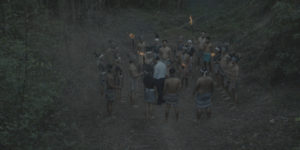
To Listen in a Rhythm
We spoke of challenges of the region. He said how the challenges are the same everywhere. “We need to ensure that our cinema travels to the world. We should concentrate on how to connect with the audience. Different and genuine film festivals are so important in this regard.”
He said he does not make concept films; he feels that it is important to be true to emotions at a given moment so that, “looking back, you will never see anything fake”.
Filmmaker Andrei Tarkovsky is his inspiration. “I really look up to him because he opened my eyes. I realised cinema can be so personal,” he says, adding how influence is not always ‘conscious’; rather, every film and book becomes a part of you subconsciously.
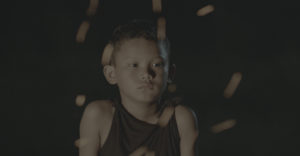
Dominic’s films have a circular rhythm. Ianche Sangma, the protagonist in Karyukai Inc and Rongkuchak connects the dots in all three films. His presence subtly lingers in Ma.Ama. The line between dream and reality becomes thin.
As the filmmaker says, “I want to be an author in my cinema where I depict how I perceive my world.”



